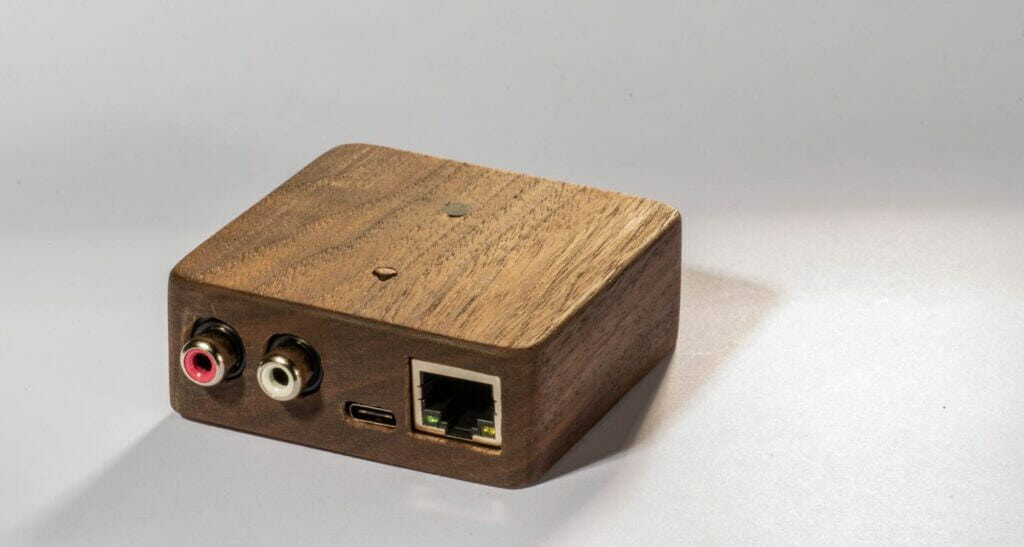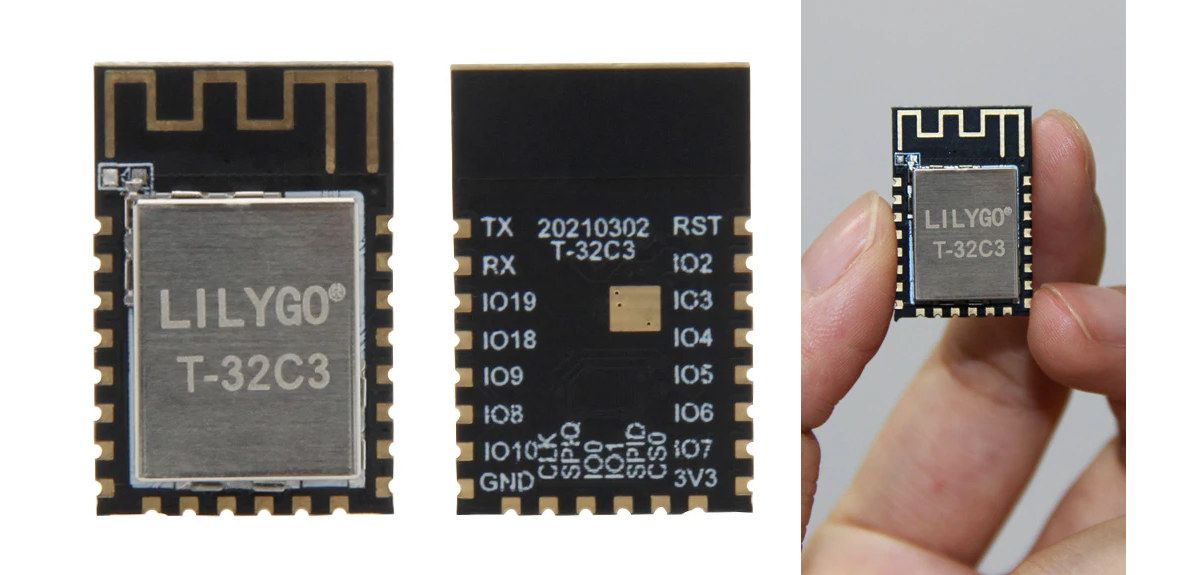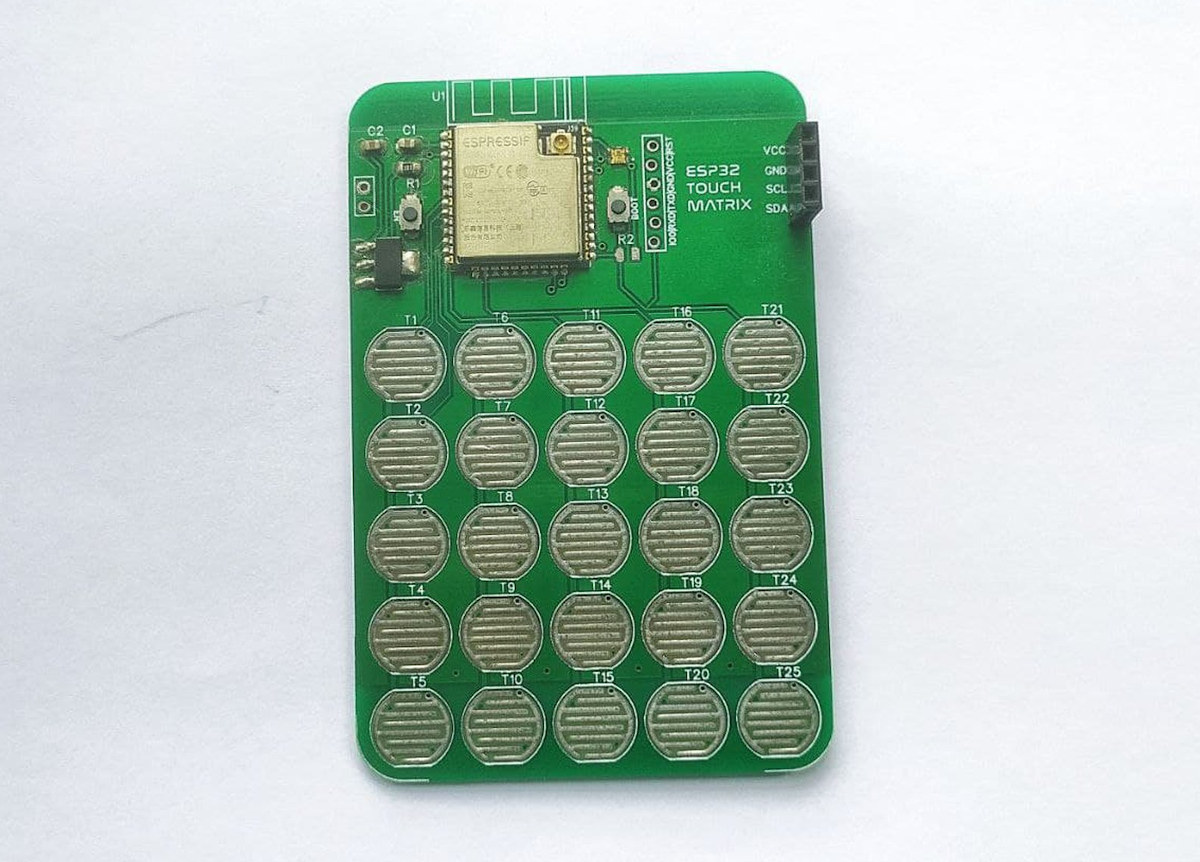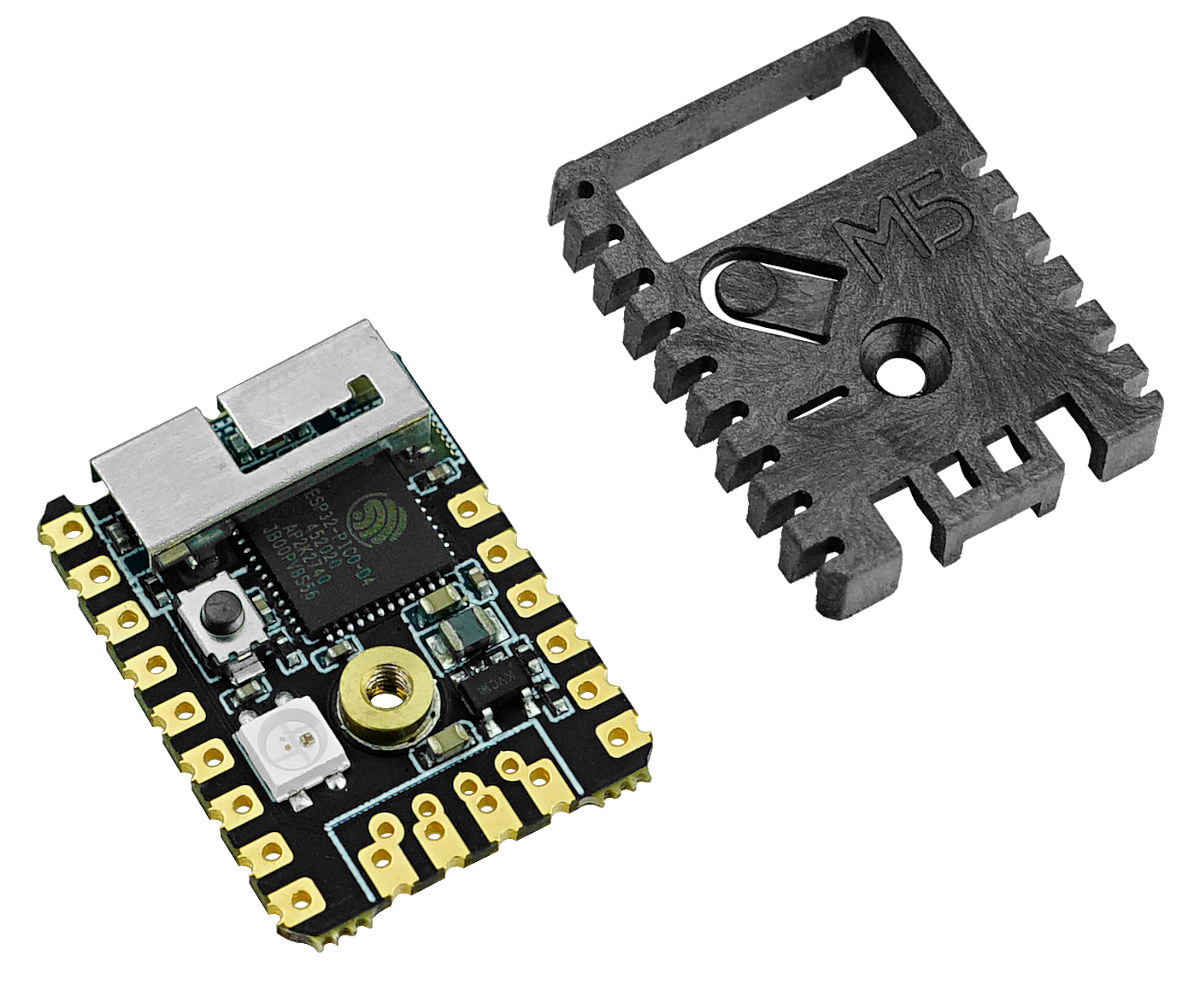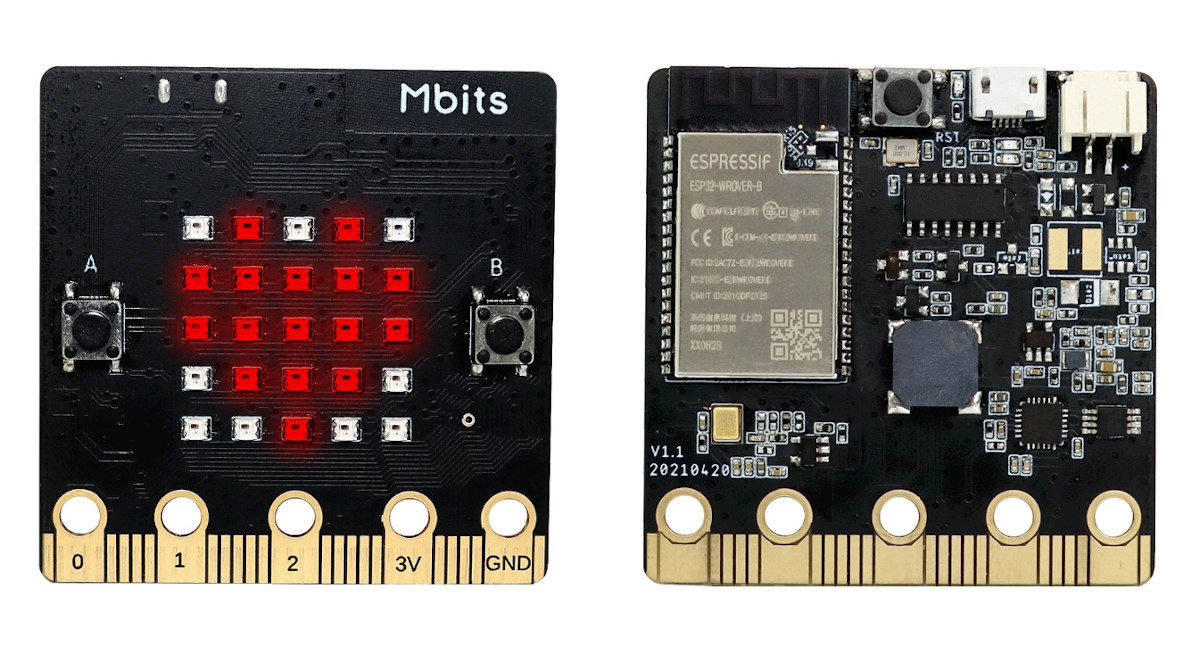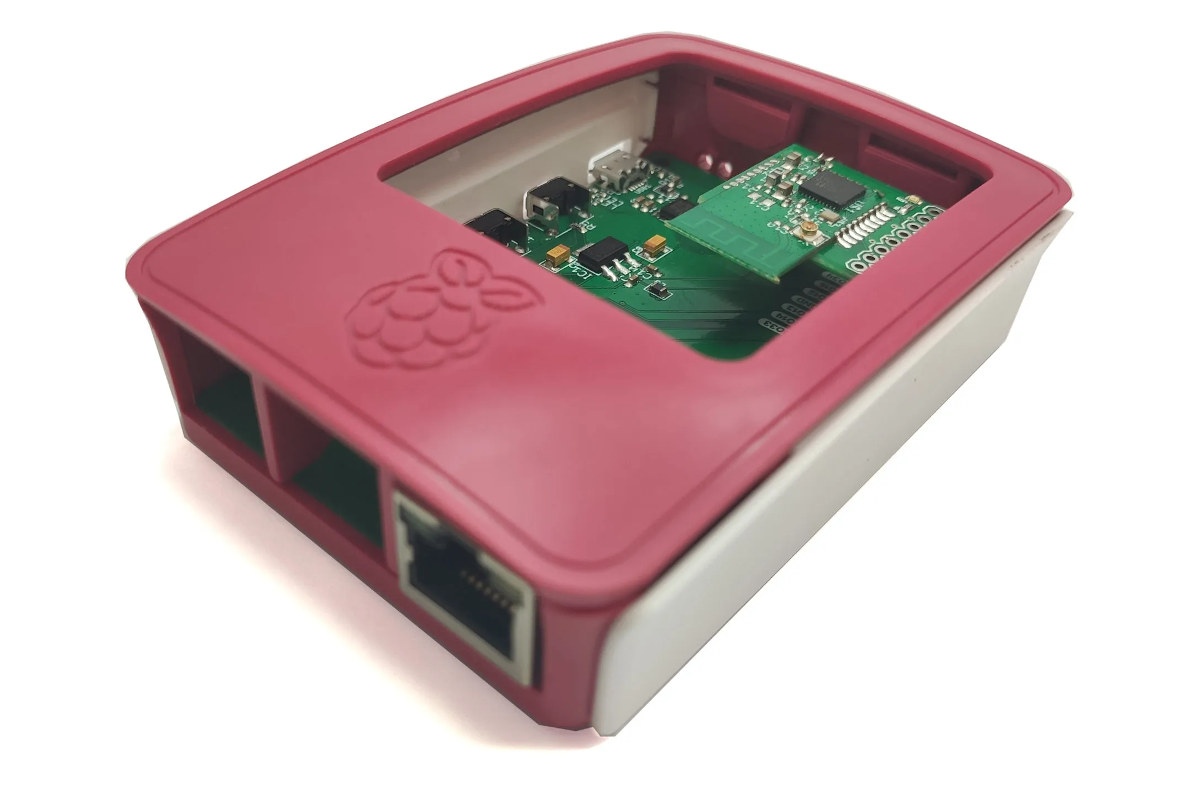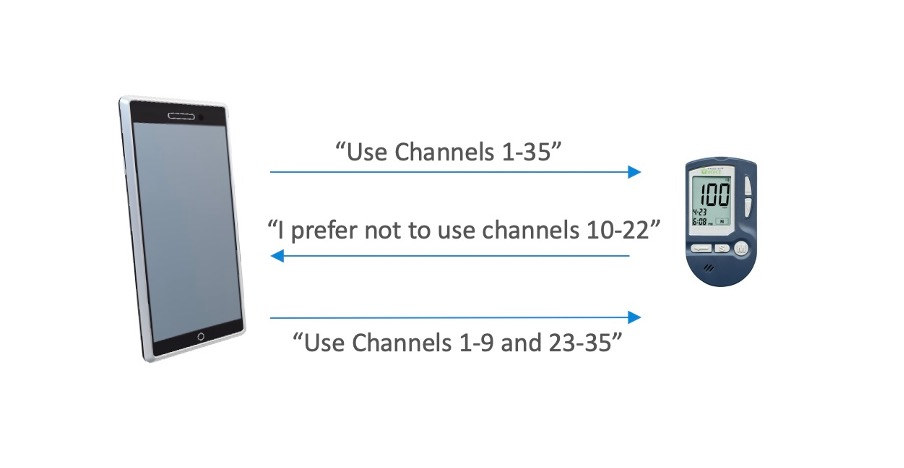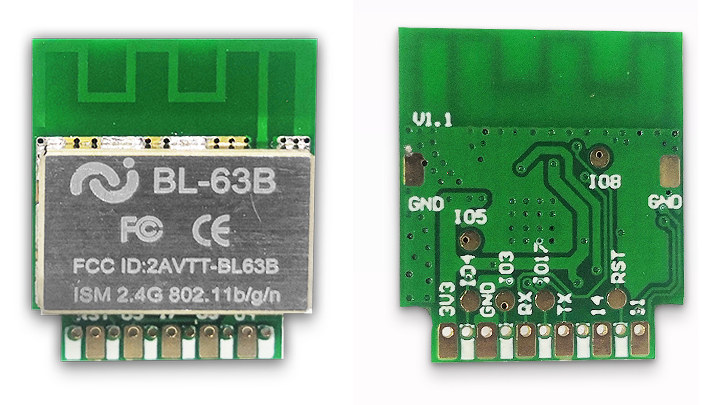The Spotify Box is a small DIY device based on an Allwinner V3s single-core Cortex-A7 camera SoC and a wooden enclosure designed to play Spotify songs, and not much else… The device serves as a bridge between the official Spotify app and your home audio system connected through the RCA jacks of the box. and allowing you to connect your smartphone to your audio setup and stream music throughout your house. Spotify Box specifications: SoC – Allwinner V3s single-core Cortex-A7 processor @ 1.2 GHz with on-chip 64MB DDR2 Storage – MicroSD card slot for OS Audio – 2x RCA jack for left and right audio Connectivity 10/100M Ethernet RJ45 port 2.4 GHz 802.11b/g/n WiFi 4 and Bluetooth 4.2 via RTL8723DS module Misc – Push button, RGB LED Power Supply – 5V via USB-C port Evan Hailey selected Allwinner V3s over other processors such as NXP i.MX233 or Microchip SAM9N because […]
LILYGO T-32C3 – A small ESP32-C3 WiFi & BLE IoT module with 4MB flash
We’re slowly starting to see more hardware-based on ESP32-C3 RISC-V processor, and LILYGO T-32C3 is a compact module based on the WiFi & Bluetooth LE processor that includes 4MB flash and a PCB antenna. I’d expect T-32C3 to be eventually found in the company’s smartwatches and development boards, and it joins other ESP32-C3 modules from AI Thinker. LILYGO T-32C3 module specifications: SoC – Espressif ESP32-C3 RISC-V processor @ 160 MHz with 400 KB SRAM, 384 KB ROM, 8KB RTC SRAM, 2.4 GHz WiFi 4, Bluetooth 5.0 LE & Mesh Storage – 4MB flash On-board PCB antenna I/Os – 22x castellated holes with GPIO, 3x ADC, SPI, UART, I2C, Boot, Reset, 5V, 3.3V, GND Dimensions – 23 x 11 x 3.5 mm (4-layer PCB) Note the USB interface is not listed in the specs, but USB DN and DP signals are located on GPIO18 and GPIO19 so USB should also be […]
25-key ESP32 Touch Matrix makes good use of ESP32’s touch sensor interface
Besides the addition of Bluetooth, there are many differences between ESP8266 and ESP32 and one of the lesser-known interfaces may be ESP32’s touch sensor interface. India-based Electro Point’s ESP32 Touch Matrix makes good use of the touch sensor interface with 25 touch pads arranged in a 5×5 matrix creating a wireless keypad that could connect over WiFi or Bluetooth to a host. ESP32 Touch Matrix board specifications: Wireless module – ESP32-WROOM-32U with Espressif ESP32-D0WD dual-core Tensilica processor, 32Mbit SPI flash, 2.4 GHz WiFi, and Bluetooth LE connectivity 25 keys arranged in a 5×5 matrix Expansion – 4-pin I2C header for expansion, e.g. an OLED display Programming – Programming headers Misc – RGB status indicator, EN button Power Supply – 5V input via 2-pin header; built-in 3.3v regulator for ESP32 Dimensions – TBD When a capacitive load, such as a human hand) is in close proximity to the sense-pad, the sensor […]
M5Stamp Pico ESP32-PICO-D4 module ships with a heat-resistant plastic shell
Most WiFi IoT modules are designed to be integrated into products with an enclosure, but the M5Stamp Pico module based on ESP32-PICO-D4 SiP comes with a removable heat-resistant plastic shell that protects the 3D antenna and components, while leaving space to solder headers and/or a Grove connector. The tiny module also comes with a button and RGB LED, and like other ESP32-based M5Stack hardware, M5Stamp Pico is programmable with UIFlow graphical programming platform and compatible with Arduino, MicroPython, and the ESP-IDF. M5Stamp Pico specifications: System-in-Package – Espressif Systems ESP32-PICO-D4 SiP with dual-core processor @ 240MHz, 520KB SRAM, 4MB flash, and 2.4 GHz Wi-Fi 4 up to 150 Mbps and Bluetooth 4.2 BR/LE connectivity Antenna – 2.4 GHz 3D antenna I/Os – 2.54mm pitch header with ADC, DAC, touch sensor, SD/SDIO/MMC host controller, SPI, SDIO/SPI slave controller, EMAC, PWM, UART, I2C, I2S, IR remote controller, up to 12x GPIO, pulse counter […]
An ESP32-based BBC Micro:bit clone – Meet Mbits
A few years ago, we noted a BBC Micro:bit clone based on ESP32 WiSoC with Banana Pi ‘s BPI:bit board with an array of 25 RGB LEDs and WiFi & Bluetooth LE connectivity. There’s now another such clone with Elecrow Mbits designed in a way that resembles the BBC Micro:bit v2 board, but replacing the Nordic Semi nRF52833 2.4GHz/BLE SoC with the ESP32 dual-core wireless chip with support for both WiFi and BLE. The specifications between Elecrow Mbits and BBC Micro:bit v2 are close enough, although ESP32 is a more powerful processor, and the MBits board comes with more memory and storage. Power consumption of the BBC Micro:bit v2 should be much better, so if anything needs to run on battery for an extended period of time, it may be a better choice, or you’re gonna need a bigger battery. The GPIO pinout looks different too, so not all Micro:bit […]
ZiGate-Ethernet – An ESP32 Ethernet, WiFi, and BLE Gateway with optional Zigbee connectivity
Frédéric Dubois, aka fairecasoimeme, has recently released ZiGate-Ethernet, an home automation gateway based on Espressif Systems ESP32 wireless SoC with Ethernet, WiFi, and Bluetooth LE connectivity. The gateway can also take an optional PiZiGate+ Zigbee module for support for a wider range of home automation gizmos, and everything is designed to fit in the official Raspberry Pi 4 enclosure. ZiGate-Ethernet specifications: Wireless module – ESP32-WROOM-32E with ESP32 dual-core processor, 16MB flash, PCB antenna Connectivity 10/100M Ethernet RJ45 port implemented through LAN8720 as on several other ESP32 Ethernet boards 2.4GHz WiFI 4 Bluetooth LE 4.2/5.x Zigbee through PiZiGate+ module with PCB antenna or optional external antenna USB – Micro USB port for power and programming Expansion – 16-pin GPIO header with up to 10x GPIO, 7x ADC, UART, 5V, 3.3V, and GND Misc- Reset and Flash button, ESP32/FTDI UART selection switch, Power Supply – 5V/500mA via micro USB port Dimensions – […]
Bluetooth 5.3 new features lower latency, interference, improve battery life, security
Bluetooth 5.3 Core Specification was adopted on July 13, 2021, without fanfare, and the only related announcement that I could find is CEVA RivieraWaves Bluetooth IP getting support for Bluetooth 5.3. Bluetooth 5.3 brings four new features or enhancements and removes one extension from the core specification: Periodic Advertising Enhancement – The AdvDataInfo (ADI) field of the common extended advertising payload format may now be included in AUX_SYNC_IND protocol data units (PDUs) which are broadcast when a device is performing periodic advertising. The Bluetooth Low Energy (LE) controllers may now use the information in the ADI field to recognize packets that contain retransmitted copies of identical or semantically equivalent data, and discard those packets in order to prevent unnecessary processing on the nodes, and make sure the overall throughput is not affected due to retransmitted packets. Encryption Key Size Control Enhancement – In Bluetooth BR/EDR, encryption key sizes are negotiated […]
BL-63B – A smaller BL602 IoT module that sells for $1.5
Bouffalo Labs BL602 is a low-cost, low-power RISC-V microcontroller that offers 2.4 GHz WiFi and Bluetooth 5.0 LE connectivity for IoT projects for about the price of ESP8266. We first discovered it last year, together with a development board. Pine64 created its own PineCone board fitted with the $2 PineNut module, and some reverse-engineering work has started on BL602 SDK. But there’s now another smaller BL602 module with “Machine Intelligence” (that’s the company name) BL-63B that sells for $1.5 on Taobao in China, as well as on LCSC Electronics albeit you’d need to purchase 1000 pieces to get that price, and single-unit pricing is currently $2.5. BL-63B WiFI & BLE module specifications: SoC – Bouffalo Labs BL602 32-bit RISC-V processor @ up to 192 Mhz with 276KB RAM, 128KB ROM, 1Kbit eFuse, WiFi and BLE Storage – 2MB flash Wireless 2.4GHz 802.11b/g/n WiFI 4 1×1 SISO up to 65 Mbps […]


